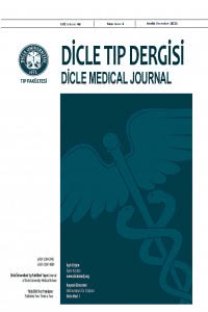Timokinon meme kanseri hücrelerinde Bax/BAD ve Bcl-2 yolakları aracılığıyla apoptozu uyarmaktadır
Thymoquinone induces apoptosis via targeting the Bax/BAD and Bcl-2 pathway in breast cancer cells
___
- 1. Yeo B, Turner NC, Jones A. An update on the medical management of breast cancer. BMJ 2014;348:g3608.
- 2. Becker S. A historic and scientific review of breast cancer: The next global healthcare challenge. Int J Gynecol Obstet. 2015;131: 36-9.
- 3. Beresford MJ, Wilson GD, Makris A. Measuring proliferation in breast cancer: practicalities and applications. Breast Cancer Res. 2006; 8:216.
- 4. Chen MC, Lee NH, Hsu HH, et all. Thymoquinone induces caspase-independent, autophagic cell death in CPT-11-resistant lovo colon cancer via mitochondrial dysfunction and activation of JNK and p38. J. Agric. Food Chem. 2015;63:1540-6.
- 5. Gali-Muhtasib HU, AbouKheir WG, Kheir LA, Darwiche N, Crooks PA. Molecular pathway for thymoquinone-induced cell-cycle arrest and apoptosis in neoplastic keratinocytes. Anticancer Drugs, 2004;15: 389-99.
- 6. Banerjee S, Padhye S, Azmi A, et all. Review on molecular and therapeutic potential of thymoquinone in cancer. Nutr Cancer. 2010; 62: 938-46.
- 7. Burits M, Bucar F. Antioxidant activity of Nigella sativa essential oil. Phytother Res. 2000; 14: 323-8.
- 8. Ali B, Blunden G. Pharmacological and toxicological properties of Nigella sativa. Phytother Res. 2003; 17:299-305.
- 9. Badary OA, Taha RA, Gamal el-Din AM, Abdel-Wahab MH. Thymoquinone is a potent superoxide anion scavenger. Drug ChemToxicol. 2003;26:87-98.
- 10. El Gazzar M, El Mezayen R, Marecki JC, et all. Antiinflammatory effect of thymoquinone in a mouse model of allergic lung inflammation. IntImmunopharmacol. 2006; 6: 1135-42.
- 11. Worthen DR, Ghosheh OA, Crooks PA. The in vitro anti-tumor activity of some crude and purified components of blackseed, Nigella sativa L. Anticancer Res. 1998;18: 1527–32.
- 12. Jafri SH, Glass J, Shi R, et all. Thymoquinone and cisplatin as a therapeutic combination in lung cancer: in vitro and in vivo. J ExpClin Cancer Res. 2010; 29:87.
- 13. Li F, Rajendran P, Sethi G. Thymoquinone inhibits proliferation, induces apoptosis and chemosensitizes human multiple myeloma cells through suppression of signal transducer and activator of transcription 3 activation pathway. Br J Pharmacol. 2010;161:541–54.
- 14. El-Mahdy MA, Zhu Q, Wang QE, Wani G, Wani AA. Thymoquinone induces apoptosis through activation of caspase-8 and mitochondrial events in p53-null myoloblastic leukemia HL-60 cells. Int J Cancer. 2005;117: 409-17.
- 15. Gali-Muhtasib H, Diab-Assaf M, Boltze C, et all. Thymoquinone extracted from black seed triggers apoptotic cell death in human colorectal cancer cells via a p53-dependent mechanism. IntJ Onco. 2004; 25: 857-66.
- 16. Parkin DM. Global cancer statistics in the year 2000. Lancet Oncol. 2001;2: 533-43.
- 17. Demain AL, Vaishnav P. Natural products for cancer chemotherapy. Microb Biotechnol. 2011; 4:687-99.
- 18. Hata AN, Engelman JA, Faber AC. The BCL-2 family: key mediators of the apoptotic response to targeted anti-cancer therapeutics. Cancer Discov. 2015; 5: 475-87.
- 19. Yang E, Zha J, Jockel J, Boise LH, Thompson CB, Korsmeyer SJ. Bad, a heterodimeric partner for BclXL and Bcl-2, displaces Bax and promotes cell death. Cell. 1995;80:285–91
- 20. Scheid MP, Schubert KM, Duronio V. Regulation of Bad Phosphorylation and Association with Bcl-xL by the MAPK/Erk Kinase. The Journal of Biological Chemistry. 1999; 274: 31108-13.
- 21. Kocak N, Yildirim IH, YildirimCing S, Cellular functions of p53 and p53 gene family members p63 and p73, Dicle Medical Journal, 2011; 38:530-35.
- 22. Marjaneh M, Narazah MY, Shahrul H. Apoptosis pathway targeted by thymoquinone in MCF7 breast cancer cell line. International Scholarly and Scientific Research & Innovation 2015; 9:87-91.
- 23. Arafa ESA, Zhu Q, Shah ZI, et all.,Thymoquinone upregulates PTEN expression and induces apoptosis in doxorubicin-resistant human breast cancer cells. Mutat. Res. 2011;706: 128–35.
- 24. Woo CC, Hsu A, Kumar AP, Sethi G, Tan KH. Thymoquinone inhibits tumor growth and induces apoptosis in a breast cancer xenograft mouse model: the role of p38 MAPK and ROS. PLoS One. 2013 Oct 2; 8:e75356. doi: 10.1371/journal.pone.0075356. eCollection 2013.
- 25. Shanmugam MK, Ahn KS, Hsu A, et all., Thymoquinone Inhibits Bone Metastasis of Breast Cancer Cells Through Abrogation of the CXCR4 Signaling Axis. Front Pharmacol. 2018 Dec 4;9:1294. doi: 10.3389/fphar.2018.01294
- 26. Mostofa AGM, Hossain MK, Basak D, Bin Sayeed MS. Thymoquinone as a Potential Adjuvant Therapy for Cancer Treatment: Evidence from Preclinical Studies. Front Pharmacol. 2017 Jun 12;8:295. doi: 10.3389/fphar.2017.00295. eCollection 2017.
- 27. Kabel AM, El-Rashidy MA, Omar MS (2016) Ameliorative Potential of Tamoxifen/Thymoquinone Combination in Patients with Breast Cancer: A Biochemical and Immunohistochemical Study. Cancer Med Anticancer Drug 1:102. doi:10.4172/cmacd.1000102
- 28. Bashmail HA, Alamoudi AA, Noorwali A, et all., Thymoquinone synergizes gemcitabine anti-breast cancer activity via modulating its apoptotic and autophagic activities. Scientific Reports 2018; volume 8, Article number: 11674.
- 29. Alobaedi OH, Talib WH, Basheti IA. Antitumor effect of thymoquinone combined with resveratrol on mice transplanted with breast cancer. Asian Pasific Journal of Tropical Medicine 2017; 10: 400-8.
- ISSN: 1300-2945
- Yayın Aralığı: Yılda 4 Sayı
- Başlangıç: 1963
- Yayıncı: Cahfer GÜLOĞLU
Yaşar ÖZDENKAYA, Cenk ERSAVAŞ, Oktay OLMUŞÇELİK, Pelin BASIM, İrem ÖZÖVER, MEHMET ŞEKER, Naciye Çiğdem ARSLAN
Hatice DÜLEK, Zeynep TUZCULAR VURAL, Işık GÖNENÇ
Spillage and recurrence in surgical management of hydatid cyst of the liver
Yavuz ORAK, Salih YILDIRIM, Rukiye MENENCİOĞLU, Ahmet ALTUN, Filiz ORAK, Cevdet DÜGER, Esra ÖZPAY, Fatih Mehmet YAZAR
Pektus Bar’lı Olguların Serum ve İdrar Örneklerinde Eser Elementlerin Değerlendirilmesi
Salih YILDIRIM, YAVUZ ORAK, Rukiye MENENCİOĞLU, Ahmet ALTUN, Filiz ORAK, Cevdet DÜGER, Esra ÖZPAY, Fatih YAZAR
Atypical Optic Nerve Sheath Menengioma Mimics Like Optic Neuritis; A case report
Umay GÜVENÇ, Gözde ORMAN, Gülten SUNGUR, Selma UZMAN
SERKAN DEĞİRMENCİOĞLU, Olçun Ümit ÜNAL, ESİN OKTAY
Sağlık Alanında Kullanılan Kantitatif Yöntem, Stereoloji
Timokinon meme kanseri hücrelerinde Bax/BAD ve Bcl-2 yolakları aracılığıyla apoptozu uyarmaktadır
